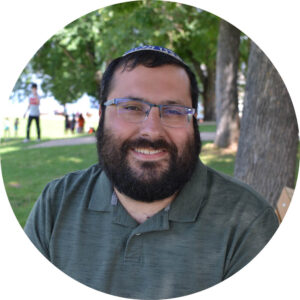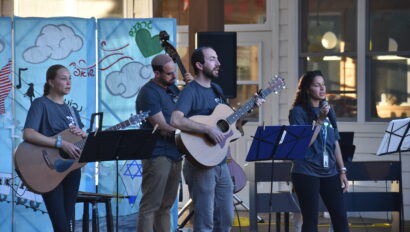by Jacob Cytryn, Executive Director
This week, as we we turn the corner from Purim to Passover and with less than three months until the first day of camp, we are excited to launch the Kol Yisrael series of weekly reflections by members of our senior staff about our theme for the 2024 summer:
כל ישראל ערבין זה בזה
kol yisrael areivin zeh bazeh
All of Israel is responsible for each other.

The nature of our lives is to have our reality separated – at times for only ourselves or a limited circle of family or friends, at other times for a broader community, nation, or planet – into “before” and “after” distinctions. The first such moment of my life was September 11, 2001; in the years since I can now point to March 15, 2020, the onset of the COVID-19 pandemic, and October 7, 2023. Each of us has these moments, occasionally for the better – days we met a person who would change our life, a sports team transformed our identity as fan from perpetual suffering loser to champion, weddings, birthdays – and often for the worse – diagnoses, deaths, losses of all types.
As we prepare for the first summer after October 7th, it is one of these “after”s in which we live. October 6 feels like much more than 174 days ago. And, in a refrain we continue to hear, drenched in pain and lived trauma, from parts of Israeli society, there are those who have experienced these 25 weeks as one long day; for so many, it is still October 7th.
In the wake of October 7th, the shock and pain and concern of the first hours and days, and the dull ache and pain of the horrors of its aftermath and the war Hamas’s attack precipitated in which we still live, I have experienced an almost tangible feeling of Jewish peoplehood, of a sense of shared destiny and lot, of the messiness of interconnected, intermingled, uninvited intimacy. This feeling of peoplehood is the result of a pull and a push. The pull is a longing for closeness with my family, a call to figure out how to live together within the Jewish tent, with those who sit to my left and my right, a call for realignment and clarification of who we are and where we are going. And the push is from the outside, from voices at times well-intentioned, ignorant, spiteful, and/or repulsive that drip with age-old anti-Semitic tropes in how they make us feel as Jews, even if the utterers, from ignorance or cluelessness or denial or something else, cannot see why, or admit it to themselves.
We are in a moment when Jewish peoplehood is as important as ever, both because of an ancient problem, when others define our Jewishness and put us together with their words and actions, and with the potential of a new and hopeful opportunity, embracing the potential of worldwide Jewry, of k’lal yisrael, for an understanding of Jewishness, of our power and responsibility, our Zionism, of our role as Jews in the world, that can speak to our generation in a fresh way.
It is at moments like this that we, the Camp Ramah in Wisconsin community, must embrace our dual reality: we are a summer camp and we are so much more. In the weeks to come we will read reflections of this summer’s hanhalah, camp leadership team, on the ways that this idea – that Jews have an innate responsibility towards each other – manifests itself in our lived reality at camp and how things we have learned and lived at camp, and people we have met at camp, help us see the reality of kol yisrael areivin zeh bazeh in our lives outside of and beyond camp. We will read stories and thoughts on how this period after October 7th refracts our understanding of our lives before; of how building community at camp embodies, complicates, and challenges this notion; and about how the things we take away from camp – memories, friendships, feelings of belongings, new understandings of ourselves and our Judaism – help us build a more resolute, nuanced Jewish world.
I leave you this week with one core conclusion the last few years at camp, and the last few months, have underscored for me. Being responsible for each other means, first and foremost, pushing ourselves to empathize with each other. One of our most important principles when engaging in dialogue at camp, about topics mundane and sacred, simple and complex, ultimately irrelevant and absolutely eternal, are holding and caring about the humanity of the other people who live in our community with us. One of the ways we will bring this idea of כל ישראל ערבין זה בזה / kol yisrael areivin zeh bazeh to fruition at camp this summer is by centering empathy at the core of our interpersonal relationships and, indeed, making those relationships with the other Jews with whom we make community over the summer the most important part of our work. It is a clichéd truism in our Ramah community – “camp is for the friends” they say – and, if we adopt a slightly broader definition of “friends,” it is beautifully true and the key to our potential.





